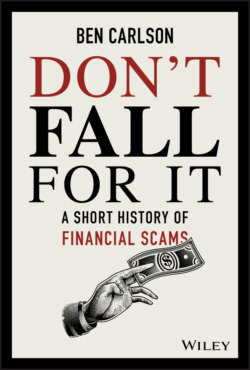Читать книгу Don't Fall For It - Carlson Ben, Ben Carlson - Страница 15
The Count
ОглавлениеThe man who tried to sell the Eiffel Tower had up to 45 different aliases. No one knew his real name or exactly where he came from, but he told authorities at one point his name was Robert Miller. As a young man traveling on an ocean liner from Europe to America, Miller came up with the name Victor “the Count” Lustig to fit in with the aristocrats on the ship. The name was a ploy to gain their trust. An ability to know his audience and adapt to any situation would prove to be an invaluable asset to Lustig over time. He began his career as a gambler but graduated to financial scams after figuring out how the wealthy class operated.
The Count’s most successful scam was called the Romanian Money Box. To find his marks, Lustig would hang around expensive hotels, arriving by limo to show he belonged with the upper echelon of society. In bars and restaurants he would casually let it slip that he owned a secret money-printing box. After the seed was planted, the mark would go to Lustig’s hotel room for a demonstration of how the contraption worked. Lustig would insert a single $100 bill into a small slot in the machine, which was a small wooden box full of knobs and brass dials. A substance called “radium” was Lustig’s secret weapon for copying the bills. At least that’s what he told his unsuspecting victims. For show, he would turn a few knobs and tell the person the only downside was that it took six hours to make a new bill using this secret substance.
After dinner and drinks, they would head back up to the room to find that a perfect copy of the $100 bill had popped out the other end of the box. When the wealthy elite saw this magical money-making machine actually worked they would offer to buy it on the spot. But the Count played it cool, always holding out for a short time, which invariably drove up the price people were willing to pay.[3] One of the best ways to persuade someone to do something is to allow them to come to the conclusion themselves. Once you’ve convinced yourself you’re going to do something, you are unlikely to change your mind. Lustig let them convince themselves it was worth it.
Of course, no such magical box that could produce perfect copies of $100 bills actually existed. The “copies” that came out of the box were actual $100 bills Lustig had placed in the jury-rigged machine himself. Blinded by their greed, people would pay tens of thousands of dollars for a machine that had just $200 in it. The beauty of his scam is it would take 12 hours to produce those two bills and by the time these people realized they’d been swindled, Lustig had half a day of a head start to make his exit.
After wearing out his welcome in New York City, Lustig decided to try his hand in Chicago. In the 1920s, Al Capone ran the criminal rackets in the Windy City. Lustig was fearless, so he decided to pay a visit to the notorious gangster when he got to town to seek Capone’s approval to operate on the mob boss’s territory. Lustig told Capone he needed $50,000 to pull off a grand trade, promising the mobster he could double his money in just two months. The man known as Scarface said, “Okay, Count, double it in 60 days like you said.” Two months later he was back in front of Capone asking for forgiveness. The get-rich-quick scheme had fallen through. Capone was furious. Just as he was about to explode, Lustig handed the crime boss his original $50,000 investment back and said, “Here, sir, is your money, to the penny. Again, my sincerest apologies. This is most embarrassing. Things didn’t work out the way I had thought they would, I should have loved to have doubled your money for you and for myself – Lord knows that I need it – but the plan just did not materialize.”[4]
Capone told Lustig he was expecting either $100,000 or nothing so he was taken aback by the man’s honesty. Somehow the most notorious gangster on the planet not only gave him a pass, but Capone even counted out $5,000 from the pile to give the Count a head start in his business dealings! Here’s the kicker: Lustig had never even dreamed up a money scheme to begin with. The $50,000 was sitting in a security box the entire month. It was his plan all along to gain the mob boss’s trust and that’s exactly what he did. Of course, Lustig was only playing an honest man for this ruse. He once said, “I cannot stand honest men. They lead desperate lives, full of boredom.”[5]
